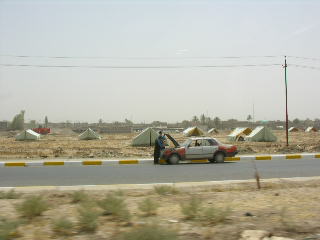Kurdistan and the Future of Iraq
Al-Sharq al-Awsat/ AFP reports that hundres of Kurds demonstrated on Monday in Irbil (Arbil), 350 km north of Baghdad, demanding that their rights be recognized in the permanent constitution now being crafted. The demonstrators gathered in front of the Kurdistan parliament building, carrying placards in Kurdish that said “Stop, Jaafari!” and “Kirkuk is Kurdistani!” and “We Reject any Constitution that does not Guarantee all our Rights!” and “The Peshmerga will Endure!” (The Peshmerga is the Kurdish militia, of at least 60,000 men and some say 100,000).
The demonstrators demanded a quick implementation of article 58 of the interim constitution, which stipulates the normalization of the situation in Kirkuk, through the return of Kurds expelled in the Saddam period and the resettlement of the Arabs Saddam had transplanted to the city in their original homes. (Many of the city’s Arab residents were orginally from the Shiite south).
The demonstration was organized by the Democratic Union of the Youth of Kurdistan, a subsidiary of the Kurdistan Democratic Party lead by Massoud Barzani.
The Kurds are demanding the inclusion of the oil-rich city of Kirkuk in the Kurdistan confederation, the recognition of provinces’ right to form confederations to deal with the central government in Baghdad (which they call “federalism”), and lack of formal recognition in the constitution of Islamic canon law.
Luke Baker of Reuters reports from Irbil (Arbil) in Kurdistan about the separatist sentiments that are apparent up there.
Another major ethnic group in Kirkuk is the Turkmen, who are probably a fourth to a third of the city of about a million. They fear that the Kurds are attempting to drive them out of it, by squatting on their property.
A correspondent in Kirkuk writes that the legitimacy of Turkmen claims to the property they say is being usurped by Kurdish squatters is uncertain. But it is certainly the case that Kurds are moving into Kirkuk in large numbers. Some are squatting, some are building new homes. This is a recent photo of Kurds living in tents on land claimed by Turkmen.
There are probably only about 750,000 or so Turkmen in northern Iraq, but they think they amount to 3 million. While they are probably only actually 3 percent of the population, they are important because neighboring Turkey has a keen interest in their fate. If violence broke out in Kirkuk that led to the ethnic cleansing of the Turkmen, it might bring Turkish troops in to stop it (assuming the US could not or would not). This article unfortunately quotes the inaccurate population statistics for the Turkmen, but otherwise it gives a fair idea of the political ideas and self-conception of activist Turkmen.




 © 2025 All Rights Reserved
© 2025 All Rights Reserved